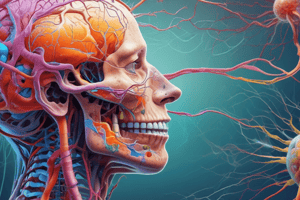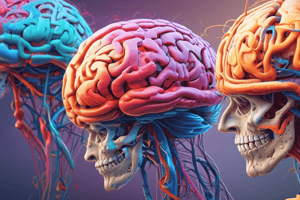Podcast
Questions and Answers
What might be a necessary step for managing cognition problems in patients?
What might be a necessary step for managing cognition problems in patients?
- Immediate hospitalization
- Implementing a rigid treatment schedule
- Referral to a community resource if needed (correct)
- Regular behavioral assessments
Which of the following is a potential impairment that treatment compliance may face in patients with cognition problems?
Which of the following is a potential impairment that treatment compliance may face in patients with cognition problems?
- Impaired memory (correct)
- Increased cognitive functioning
- Better decision-making capabilities
- Enhanced verbal communication
What aspect of dental treatment may need modifications for patients with cognitive disorders?
What aspect of dental treatment may need modifications for patients with cognitive disorders?
- Implementation of complex surgical procedures
- Longer appointment times without breaks
- Adjustments based on cognitive impairments (correct)
- Increased use of general anesthesia
Which of the following is a key component that should be included in presentation topics regarding nervous disorders?
Which of the following is a key component that should be included in presentation topics regarding nervous disorders?
In a group presentation about dementia, which group members should be involved?
In a group presentation about dementia, which group members should be involved?
Which symptom is NOT commonly associated with neurological disorders?
Which symptom is NOT commonly associated with neurological disorders?
What is a known risk factor for developing neurological disorders?
What is a known risk factor for developing neurological disorders?
Which of the following is NOT a cause of neurological disorders?
Which of the following is NOT a cause of neurological disorders?
What condition is characterized by muscle malfunctions and changes in consciousness?
What condition is characterized by muscle malfunctions and changes in consciousness?
Which neurological disorder is related to the degeneration of cognitive functions and memory?
Which neurological disorder is related to the degeneration of cognitive functions and memory?
Which symptom indicates dysphagia?
Which symptom indicates dysphagia?
Which of the following is a common medication side effect in patients with neurological disorders?
Which of the following is a common medication side effect in patients with neurological disorders?
What is a common manifestation of peripheral neuropathy?
What is a common manifestation of peripheral neuropathy?
What is a key responsibility of the dental team in relation to patient care?
What is a key responsibility of the dental team in relation to patient care?
Which of the following is true regarding managing patient anxiety during dental care?
Which of the following is true regarding managing patient anxiety during dental care?
In terms of treatment planning, what is an important consideration for a dental professional?
In terms of treatment planning, what is an important consideration for a dental professional?
How should dental professionals approach the recording of patient history?
How should dental professionals approach the recording of patient history?
What should a dental professional do before starting any treatment?
What should a dental professional do before starting any treatment?
Which of the following describes an important aspect of follow-up care in dental practice?
Which of the following describes an important aspect of follow-up care in dental practice?
What is a significant element in providing preventive education to patients?
What is a significant element in providing preventive education to patients?
What aspect of patient treatment should be guided by understanding medical and psychological conditions?
What aspect of patient treatment should be guided by understanding medical and psychological conditions?
Flashcards are hidden until you start studying
Study Notes
Nervous System Disorders
- Nervous disorders are physical conditions that affect the central and peripheral nervous systems, impacting the body.
- Central Nervous System (CNS) disorders include brain tumors, encephalitis, epilepsy, meningitis, multiple sclerosis, Alzheimer's, Parkinson's, and Huntington's disease.
- Peripheral Nervous System (PNS) disorders include conditions affecting the nerves outside the brain and spinal cord like carpal tunnel syndrome, diabetic polyneuropathy, Guillain-Barré syndrome, sciatica, and facial nerve paralysis.
- Causes of nervous disorders can include congenital factors, vascular issues, infections, degenerative diseases, trauma, and environmental factors.
- Common signs and symptoms may include pain, muscle malfunction, changes in sensation (e.g., numbness), changes in special senses, sleep problems, changes in consciousness, changes in cognition, dysphagia (difficulty swallowing), and dysarthria (difficulty speaking).
- Dental considerations involve acknowledging the potential impact of medications, medication interactions, and consent issues with patients who may have difficulty understanding information or providing consent.
- Access and mobility issues may require special considerations for dental treatment.
- Compliance with treatment may be challenging due to cognitive problems or behavioral issues.
- Special considerations include providing clear written leaflets with advice, referring to community resources if needed, and being sensitive to potential difficulties in managing anxiety and pain.
Dental Implications
- Medication side effects can include dry mouth, which needs to be discussed with the patient.
- Medication interactions pose a challenge in terms of administering medication and require careful consideration.
- Consent for treatment may be complicated by a patient's cognitive ability to understand and agree to treatment.
- Access and mobility issues may require special equipment or chair adjustments for patients to navigate the dental setting.
- Compliance with treatment can be compromised if the patient struggles with cognitive issues or experiences difficulty following instructions.
- Behavioral management requires a sensitive approach to help manage challenging behavior that may arise due to cognitive problems.
- Impaired memory necessitates providing clear and concise written information for patients to review.
- Special considerations and equipment might be required for patients with certain neurological disorders.
- Referral to community services for additional support or resources might be necessary in some cases.
Studying That Suits You
Use AI to generate personalized quizzes and flashcards to suit your learning preferences.




